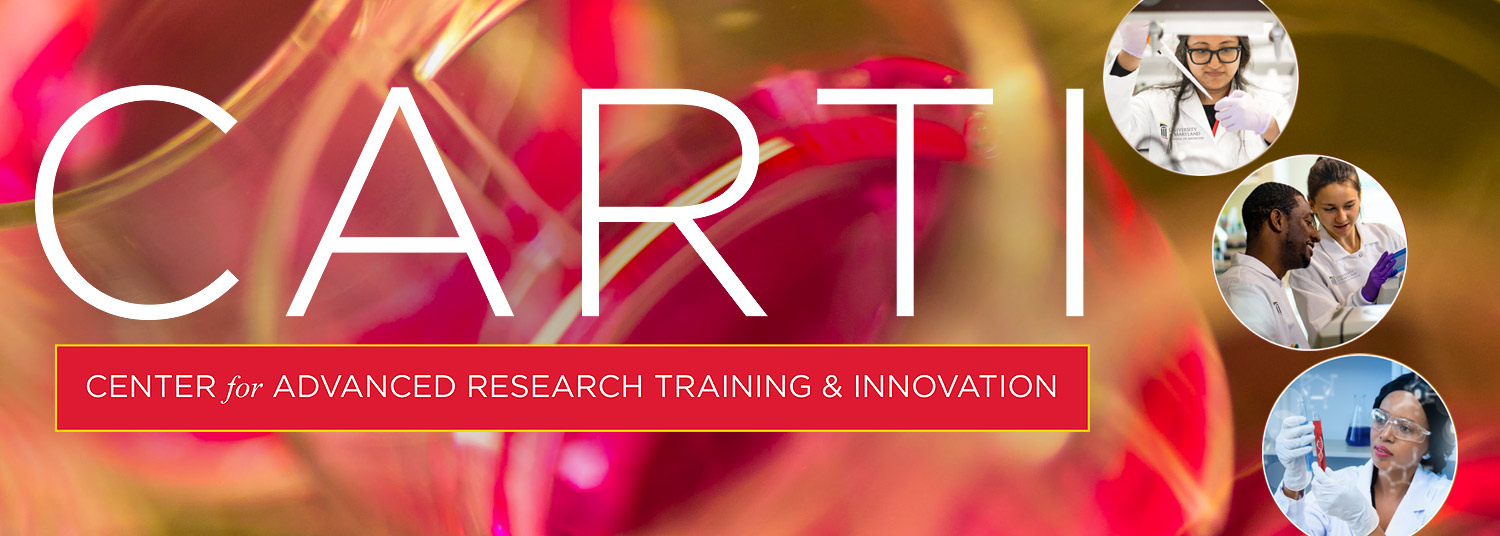February 14, 2022
New Center Builds on Long-term Success of the UMSOM Research Career Development Program
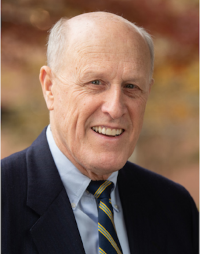 University of Maryland, Baltimore (UMB) President Bruce Jarrell, MD, announced today the official launch of an innovative new University of Maryland School of Medicine (UMSOM) Center that will focus on inspiring, growing and developing the next generation of clinician-scientists and biomedical research-scientists who will advance high-impact research and discovery.
University of Maryland, Baltimore (UMB) President Bruce Jarrell, MD, announced today the official launch of an innovative new University of Maryland School of Medicine (UMSOM) Center that will focus on inspiring, growing and developing the next generation of clinician-scientists and biomedical research-scientists who will advance high-impact research and discovery.
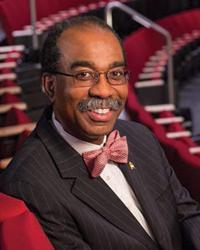 The new Center for Advanced Research Training and Innovation, or “CARTI,” will significantly expand the longstanding and highly successful UMSOM Research Career Development Program (RCDP), which was initially launched in 2007 by University of Maryland School of Medicine (UMSOM) Dean E. Albert Reece, MD, PhD, MBA, along with Dr. Jarrell, who was then UMSOM Executive Vice Dean. RCDP has been open to all UMB schools. Likewise, CARTI will be open to faculty from all schools on the campus. The Center received faculty approval at the UMSOM Council Meeting and the UMSOM Executive Committee Meeting. It was then given final approval and offical desigation by the UMB President.
The new Center for Advanced Research Training and Innovation, or “CARTI,” will significantly expand the longstanding and highly successful UMSOM Research Career Development Program (RCDP), which was initially launched in 2007 by University of Maryland School of Medicine (UMSOM) Dean E. Albert Reece, MD, PhD, MBA, along with Dr. Jarrell, who was then UMSOM Executive Vice Dean. RCDP has been open to all UMB schools. Likewise, CARTI will be open to faculty from all schools on the campus. The Center received faculty approval at the UMSOM Council Meeting and the UMSOM Executive Committee Meeting. It was then given final approval and offical desigation by the UMB President.
The CARTI will be led by Dr. Reece, as he transitions back to the faculty following his 16-year tenure as Dean. The goal of the new Center will be to provide an entry point, as a major research and education training core for faculty and senior fellows of varying levels of research education. In essence, CARTI will become a centralized “hub” for training in research, scientific communication, and leadership skills. Additionally, one of the key objectives of CARTI will be to foster research excellence and professional development among underrepresented minority and women faculty.
“We are thrilled to add the Center for Advanced Research Training and Innovation to our internationally known research institution,” Dr. Jarrell said. “Innovation and discovery are among UMB’s core values, and CARTI will encourage and inspire our next generation of research scientists. I look forward to the exciting breakthroughs to come, and know that under Dr. Reece’s leadership the center will continue to advance our mission of improving the human condition for all Marylanders and beyond.”
Built on a Foundation of Success
CARTI is built on the tremendous success of the RCDP, which has fostered and supported faculty research career development since 2007, under the leadership of founding director Wendy W. Sanders, MA, who served in that role until 2020. Over the past 14 years, faculty participation in RCDP events has increased 42 percent, growing from 576 participants in 2007 to nearly 3,300 participants in 2021.
Figure 1
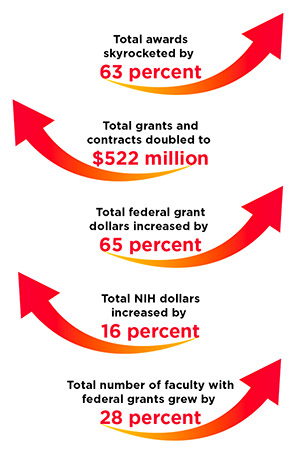 Between 2015-2020, 126 faculty participated in the Small Grant Writing Classes with participants receiving more than $50 million in total grants awarded. In addition, during this same period, 35 Scholarly Accountability Groups were formed, composed of 194 participants. In 2014, the RCD Program founded a group called the “K Club” to support career development awardees. The Club currently supports 60 junior faculty and senior fellows. These are just some of the offerings in the RCDP. Overall, they have positively impacted the research excellence and research program funding in the School of Medicine.
Between 2015-2020, 126 faculty participated in the Small Grant Writing Classes with participants receiving more than $50 million in total grants awarded. In addition, during this same period, 35 Scholarly Accountability Groups were formed, composed of 194 participants. In 2014, the RCD Program founded a group called the “K Club” to support career development awardees. The Club currently supports 60 junior faculty and senior fellows. These are just some of the offerings in the RCDP. Overall, they have positively impacted the research excellence and research program funding in the School of Medicine.
“Since 2007, the growth of research funding and investigators at UMSOM has been extraordinarily robust,” said Dr. Reece, who is also Executive Vice President for Medical Affairs, UM Baltimore, and the John Z. and Akiko K. Bowers Distinguished Professor (See Figure 1). “However, despite this success, we wish to see increased number of faculty, at all levels, engaged in increased federally-funded research. Our goal is, at least, a doubling of faculty engaged in research and with federal grants,” Dr. Reece said.
Needs Assessment Shows Strong Faculty Support for Research Training and Development
In evaluating the potential for a new center, the CARTI team conducted a needs assessment among department chairs and directors. Survey results showed that the UMSOM’s academic leaders indicated strong support for enhancing and expanding faculty research training and development.
- Survey respondents rated training in grant and scientific writing, training in foundational research skills, individual development plans, and mentoring support as most desirable for junior and mid-level faculty.
- Nearly all of the respondents indicated they would allow an average of 20 percent protected time for junior or mid-level faculty for a semi-structured program of didactic research instruction, experiential learning, and a mentored capstone.
- Respondents identified the ability to establish new collaborations, obtain leadership training, and identify visiting professorships as areas for professional development support for mid-and senior-level faculty.
CARTI Structure and Framework
CARTI will be organized into four primary areas: Training Tracks, Individual Research Career Development, Writing & Communication Instruction, and a Fellows-to-Faculty Program (See Figure 2).
Figure 2
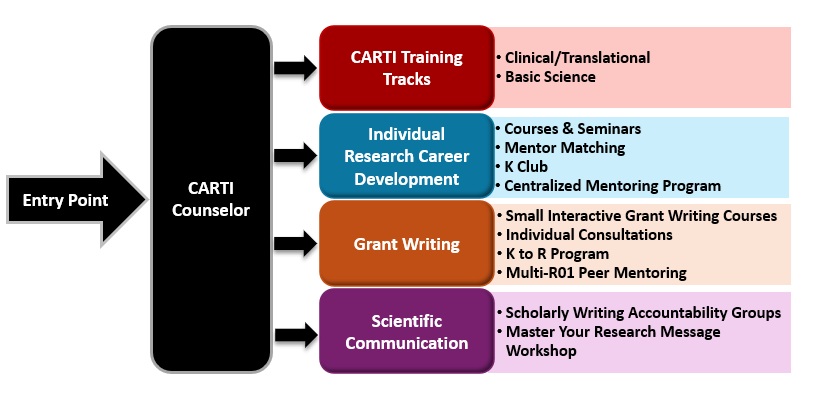
CARTI Training Tracks: There will be three tracks offered: Basic/Translational Science Track; Clinical/Translational Research Track; and Community, Health Equity & Public Health Research Track. All tracks will include 4 modules: a didactic instruction module; a writing intensive module; an experiential learning rotation module, and a capstone project module.
Individual Research Career Development. With a focus on faculty at any career stage, and with specialized opportunities for early, mid-career and senior faculty, this approach will include seminars, workshops, and individual consultations, as well as experiential learning and visiting professorships at other institutions. The goal is to support development of research skills in UMSOM faculty; foster research collaborations; create a robust pool of mentors and leaders in research and academic medicine and build new research skill sets and reinvigorate senior faculty portfolios.
Intensive Writing & Communications Instruction. Intended for all faculty at any career stage, this program will offer short courses, workshops, seminars, and small interactive group instruction, designed and administered by CARTI staff and other UMSOM faculty and staff. The goal is to increase the number of manuscripts and abstracts accepted, and number of grants submitted; improve faculty confidence and efficacy in communicating with variety of audiences; raise visibility of UMSOM research and faculty in the public sphere; and help combat misinformation about science research, and medicine in the media and on social media.
Fellows to Faculty Program. This approach will provide activities for both mentees and mentors. Mentee components will include individual development plans, mentor matching, centralized mentoring, and seminars on research program management and intensive writing and communication.
CARTI is organized as an entry point for meeting individual faculty training needs. A CARTI Counselor is the initial interface, determining the best pathway for training and career development (See Figure 3).
Figure 3
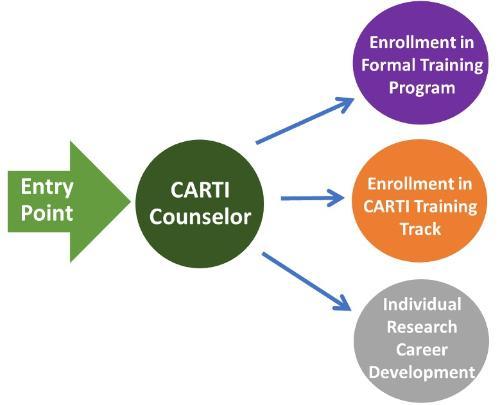 “CARTI will build on the foundation of RCDP, and continue supporting the individual needs of faculty,” said Marey Shriver, PhD, Assistant Professor, Department of Biochemistry & Molecular Biology, who is currently Director of the Office of Research Career Development. “Our counselors will work with faculty to identify their career goals and assist with finding appropriate resources both within and outside CARTI to help them achieve those goals”.
“CARTI will build on the foundation of RCDP, and continue supporting the individual needs of faculty,” said Marey Shriver, PhD, Assistant Professor, Department of Biochemistry & Molecular Biology, who is currently Director of the Office of Research Career Development. “Our counselors will work with faculty to identify their career goals and assist with finding appropriate resources both within and outside CARTI to help them achieve those goals”.
Roll Out and Participation
CARTI WILL BE LED BY A TEAM OF FACULTY AND STAFF dedicated to the research mission, including Dr. Reece; Marey Shriver, PhD; Julie Rosen, PhD; Jon Mark Hirshon, MD, MPH, PhD; Stuart Martin, PhD; Christy Chang, PhD; Freda Richards, MS; and Stacie Mendoza. CARTI offices will be located in MSTF, Room 319, (near the current RCD offfice suite.)
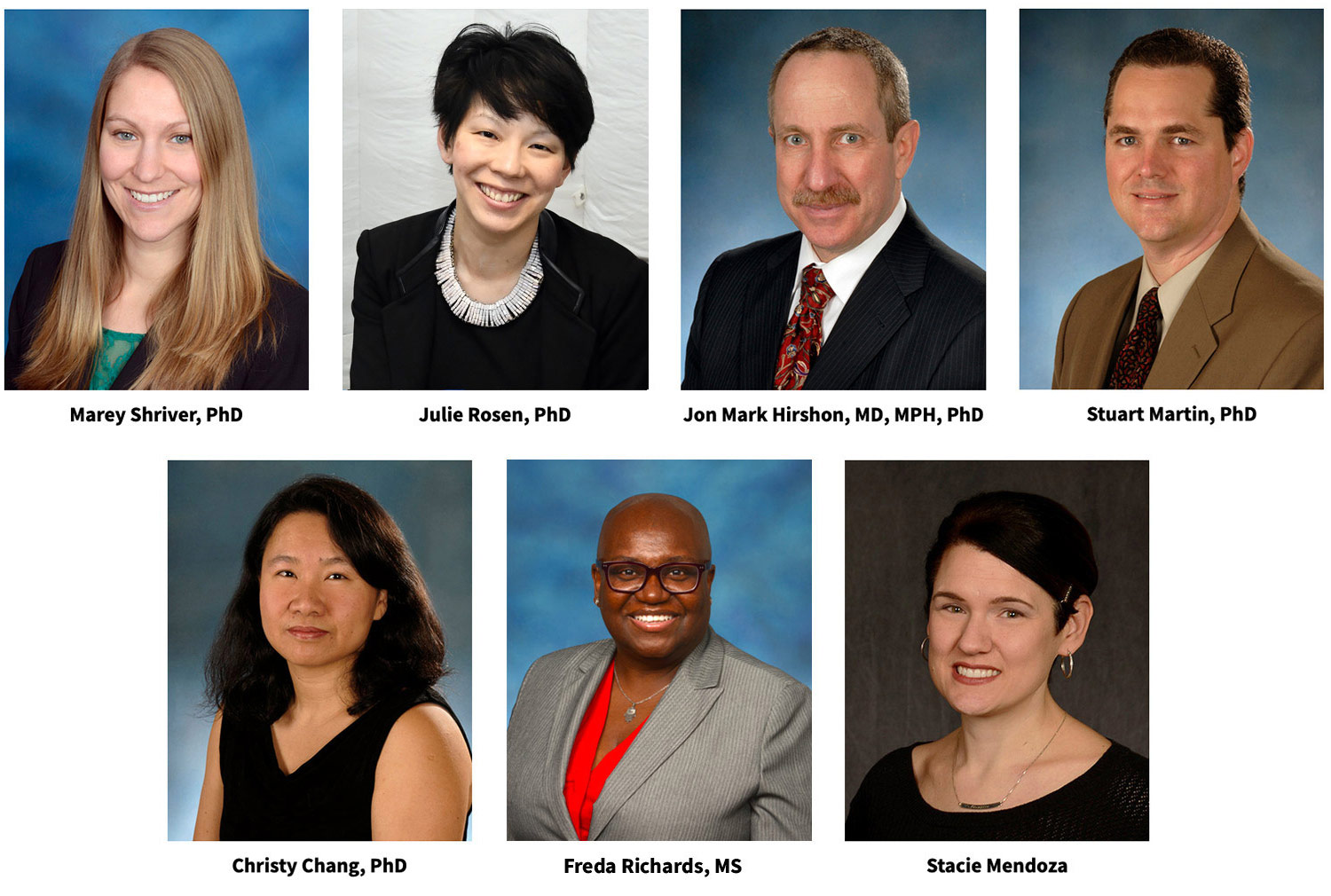
CARTI will be launched in a purposeful and phased manner to ensure a smooth expansion of RCDP to CARTI.
First, CARTI counseling services will be introduced early in the year. Early-stage faculty will be able to meet with a CARTI counselor who will provide guidance on defining short- and long-term career goals and available resources to help achieve defined goals.
Second, a new series on "communicating with the public" will be launched in the spring. This new series will provide faculty at any stage with training to improve their communication about their research with a wide range of audiences.
Third, the CARTI Clinical/Translational Research Track pilot will be launched in the spring. This training opportunity will provide senior fellows and junior faculty with the foundational skills necessary to successfully conduct clinical and translational research, and will include didactic instruction, a writing intensive, an experiential learning rotation, and a capstone project.
THE CARTI ADVISORY COMMITTEE is composed of: James B. Kaper, PhD (chair of the committee), Claire M. Fraser, PhD, Steven J. Kittner, MD, MPH, Ronna Hertzano, MD, PhD, Gregory P. Carey, PhD, Jessica A. Mong, PhD, Gloria M. Reeves, MD, Jean-Pierre Raufman, MD, and Mary-Claire Roghmann, MD, MS.
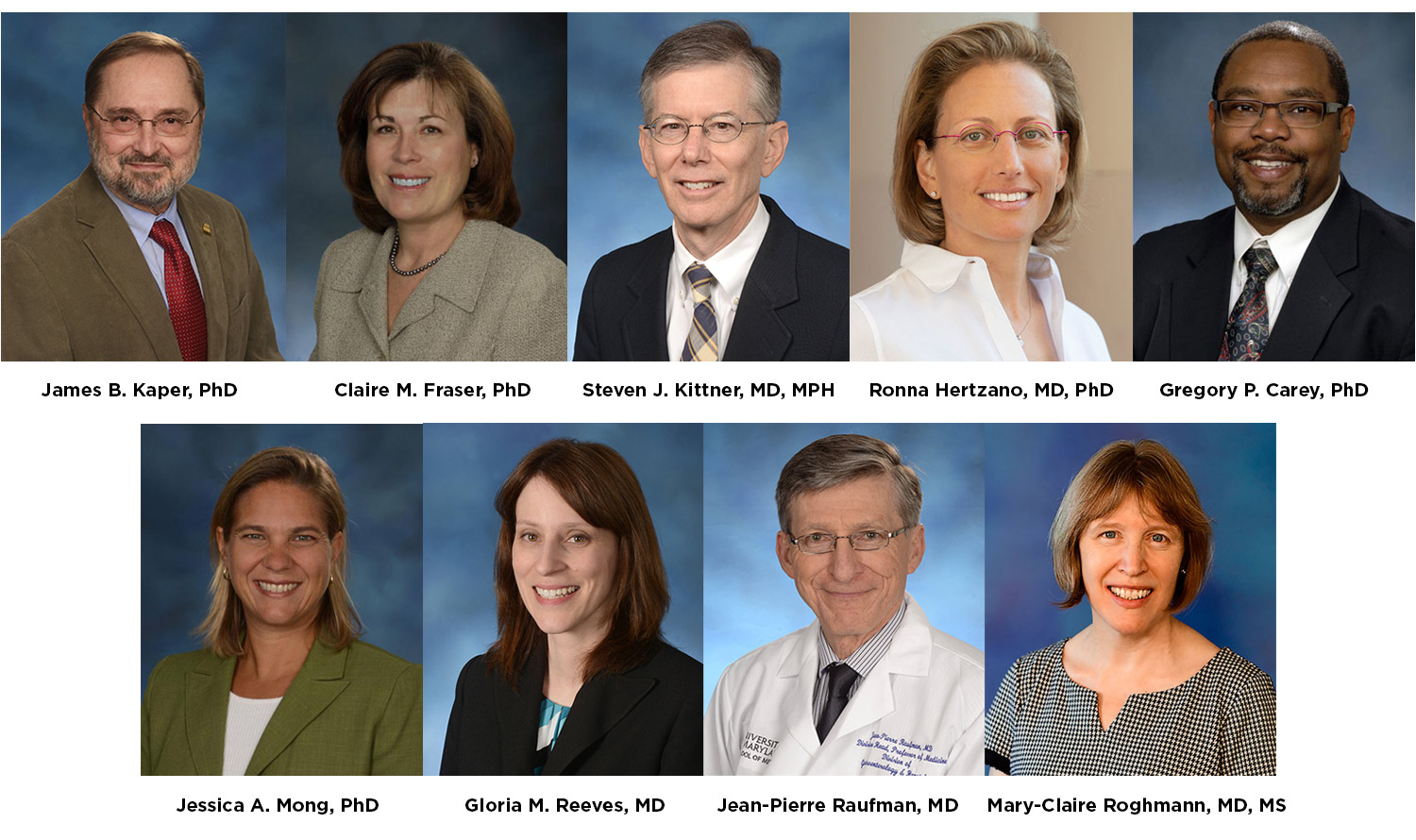
“I wish to thank Dr. Jarrell for this appointment to lead the new center,” Dean Reece said. “CARTI represents a tremendous opportunity for us to further enhance and expand our long-term commitment to train, develop and support faculty in every aspect of their research and scientific discovery endeavors. At the same time, it will help ensure the UMSOM’s long-term leadership position as a top echelon biomedical research institution.”
To register for the CARTI newsletter and to be notified of new CARTI training opportunities contact Ms. Stacie Mendoza. smendoza@som.umaryland.edu.
About the University of Maryland School of Medicine
Now in its third century, the University of Maryland School of Medicine was chartered in 1807 as the first public medical school in the United States. It continues today as one of the fastest growing, top-tier biomedical research enterprises in the world -- with 46 academic departments, centers, institutes, and programs, and a faculty of more than 3,000 physicians, scientists, and allied health professionals, including members of the National Academy of Medicine and the National Academy of Sciences, and a distinguished two-time winner of the Albert E. Lasker Award in Medical Research. With an operating budget of more than $1.2 billion, the School of Medicine works closely in partnership with the University of Maryland Medical Center and Medical System to provide research-intensive, academic and clinically based care for nearly 2 million patients each year. The School of Medicine has nearly $600 million in extramural funding, with most of its academic departments highly ranked among all medical schools in the nation in research funding. As one of the seven professional schools that make up the University of Maryland, Baltimore campus, the School of Medicine has a total population of nearly 9,000 faculty and staff, including 2,500 student trainees, residents, and fellows. The combined School of Medicine and Medical System (“University of Maryland Medicine”) has an annual budget of over $6 billion and an economic impact of nearly $20 billion on the state and local community. The School of Medicine, which ranks as the 8th highest among public medical schools in research productivity (according to the Association of American Medical Colleges profile) is an innovator in translational medicine, with 606 active patents and 52 start-up companies. In the latest U.S. News & World Report ranking of the Best Medical Schools, published in 2021, the UM School of Medicine is ranked #9 among the 92 public medical schools in the U.S., and in the top 15 percent (#27) of all 192 public and private U.S. medical schools. The School of Medicine works locally, nationally, and globally, with research and treatment facilities in 36 countries around the world. Visit medschool.umaryland.edu
Contact
Office of Public Affairs
655 West Baltimore Street
Bressler Research Building 14-002
Baltimore, Maryland 21201-1559
Contact Media Relations
(410) 706-5260
Related stories
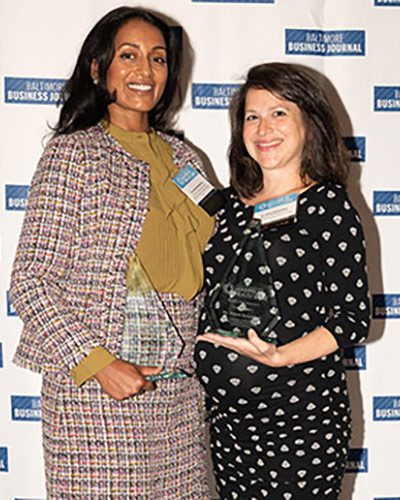
Tuesday, November 01, 2022
Three University of Maryland School of Medicine Faculty Members Honored by Baltimore Business Journal
Three University of Maryland School of Medicine (UMSOM) physician researchers were recognized when the Baltimore Business Journal announced its Leaders in Health Care and 40 Under 40 Award winners.
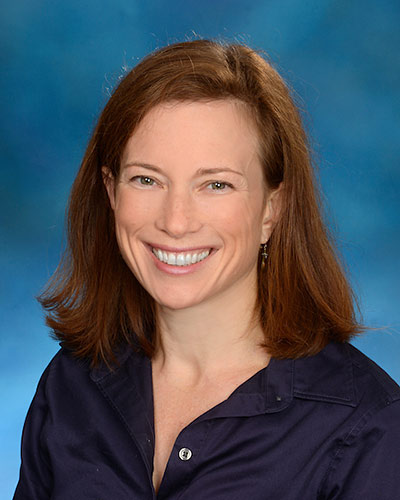
Wednesday, August 05, 2020
UMSOM Acclaimed Physician-Scientist and Student Mentor, Dr. Miriam Laufer, to Join Academic Affairs Leadership Team as Assistant Dean for Medical Student Research Education
University of Maryland School of Medicine (UMSOM) Vice Dean for Academic Affairs, James Kaper, PhD, along with UMSOM Dean E. Albert Reece, MD, PhD, MBA, announced that Miriam Laufer, MD, MPH, Professor of Pediatrics and Associate Director of the Center for Vaccine Development and Global Health (CVD), will join the Academic Affairs leadership team as Assistant Dean for Medical Student Research Education.

